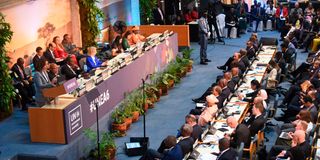UNEA cure for ‘triple crisis’

United Nations Environment Assembly (UNEA) President Leila Benali delivering her remarks at UNEP headquarters in Nairobi.
Nairobi hosted the sixth United Nations Environment Assembly (UNEA), the top-most global organ of the UN on environmental issues and made up of 193 member states, last week.
Themed “Effective, inclusive and sustainable multilateral actions to tackle climate change, biodiversity loss and pollution”, it aimed at addressing the ‘triple crisis’ that poses the greatest danger to the planet—climate change, nature and biodiversity loss and pollution and waste management.
The meeting was attended by Heads of State and over 5,000 delegations of governments, civil society, and the private sector, who addressed some of the most challenging global environmental challenges.
Discussions centred on how multilateralism, including the importance of the Multilateral Environmental Agreements (MEA), and now the concept, can address the triple issues and also how technology and financing mechanisms can be factored in to solve these problems in order to save the planet.
Around 3.6 billion hectares, or 70 per cent of the 5.2 billion hectares of the potentially productive drylands, are threatened daily by various forms of land degradation or desertification—a trend directly affecting the well-being and livelihoods of a sixth of the world population.
A third of the soil has been moderately to highly degraded, threatening food supply, while mining is one of the major challenges associated with degradation. The UN Convention to Combat Desertification (CCD), of which Kenya is a signatory, recognises land degradation as a global development and environment issue.
Some 30 per cent of the country suffers very severe land degradation, on which 12 million people, or a third of the population, depended directly. Droughts and other human activities accelerated soil degradation and reduced per capita food production.
UNEA-6 resolutions should boost the Kenya National Adaptation Plan (2015-2030) and National Climate Change Response Strategy to mitigate and address climate change and global warming issues.
Dr Giti, PhD, is an urban management, public-private partnerships (PPP) and environment specialist. [email protected]. @danielgiti





